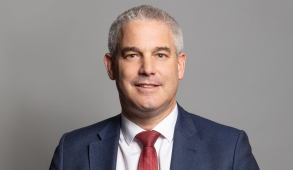Barclay urged to prioritise workforce shortages
Steve Barclay (pictured) was appointed health and social care secretary as part of new prime minister Rishi Sunak’s cabinet reshuffle on Tuesday. The appointment sees Mr Barclay return to the position he briefly held between July and September, when he was replaced by Therese Coffey as part of former prime minister Liz Truss’s short-lived cabinet.
Jeremy Hunt, former Commons Health and Social Care Committee chair, has been retained as chancellor. He was initially appointed to the lead ministerial role at the Treasury by Ms Truss, following the sacking of Kwasi Kwarteng in the aftermath of the disastrous mini-budget unveiled at the end of September. Most of the tax cuts set out in that mini-budget, which unnerved the financial markets, have already been reversed.
Saffron Cordery, interim chief executive of NHS Providers, said NHS trusts wanted the health and social care secretary to bring steady leadership and direction as pressure continues to pile upon acute, mental health, community and ambulance services.
‘Top of Barclay's priorities must be tackling severe workforce shortages with a long-term, fully costed and funded national plan to secure for the NHS the staff it desperately needs,’ she said. ‘Without it, existing staff will continue to work under immense pressure, waiting lists will get longer and patient care will suffer.’
Mr Sunak has already warned of ‘difficult decisions to come’ to address a 'profound economic crisis' and there are concerns about what this could mean for the NHS settlement. The NHS budget was set as part of last year’s spending review, but its spending power has been eroded by soaring inflation, continuing high demand, and the continuance of Covid-19.
Ms Cordery called on ministers to address the effects of the soaring cost of living on NHS workers and the fact that inflation was eating into already stretched NHS budgets. ‘There is also the cost to the NHS of the government's decision not to fully fund staff pay awards, and the damaging delays to the new hospitals programme and capital funding to improve safety for patients and staff,’ she said. She added that underfunded social care needed more support and urgent reform, which would help the NHS by freeing up hospital beds.
Matthew Taylor, chief executive of the NHS Confederation, said that challenges had intensified significantly in the time Mr Barclay had been away from the Department of Health and Social Care. ‘There are now over 132,000 vacancies across the NHS, the waiting list for elective treatment stands at over seven million people in England, and emergency care services are running incredibly hot, all of which mean patients are not getting the care they need in a timely manner,’ he said.
He called on Mr Barclay to make good on his earlier commitment to reduce the overall number of performance targets across the health service. And with one eye on potential cuts to departmental spending totals, he reminded the new health secretary that the NHS was already one of the most efficient health systems in the world with low management costs.
In a letter to the returning health secretary, Mr Taylor and confederation chair Lord Victor Adebowale also underlined the importance of increasing social care capacity. The called on Mr Barclay to unblock the £500m adult social care discharge funding and to encourage the chancellor to introduce a new national minimum care worker wage of £10.50 an hour to improve staff retention.
Local government was also quick to warn against budget cuts, which would also have a big impact on healthcare and wider population health. Tim Oliver, chairman of the County Councils Network, said that inflation and increases in demand meant councils faced an extremely challenging few years ahead. ‘Local authorities cannot have any further funding reductions,’ he said. He repeated calls for the government to delay charging reforms to adult social care in England. This would ensure ‘that all earmarked funding is retained and reinvested in frontline services to help meet the inflationary costs facing services this year and next’, he said.
Related content
The Institute’s annual costing conference provides the NHS with the latest developments and guidance in NHS costing.
The value masterclass shares examples of organisations and systems that have pursued a value-driven approach and the results they have achieved.